英语委婉语气表达法
情态动词may的用法总结
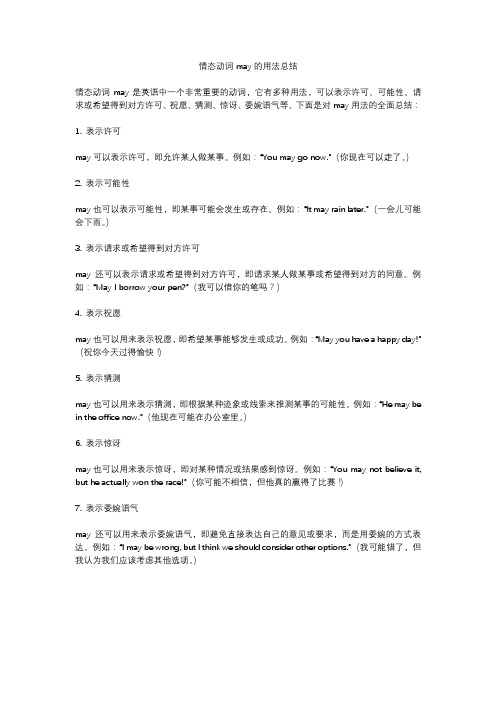
情态动词may的用法总结情态动词may是英语中一个非常重要的动词,它有多种用法,可以表示许可、可能性、请求或希望得到对方许可、祝愿、猜测、惊讶、委婉语气等。
下面是对may用法的全面总结:1. 表示许可may可以表示许可,即允许某人做某事。
例如:“You may go now.”(你现在可以走了。
)2. 表示可能性may也可以表示可能性,即某事可能会发生或存在。
例如:“It may rain later.”(一会儿可能会下雨。
)3. 表示请求或希望得到对方许可may还可以表示请求或希望得到对方许可,即请求某人做某事或希望得到对方的同意。
例如:“May I borrow your pen?”(我可以借你的笔吗?)4. 表示祝愿may也可以用来表示祝愿,即希望某事能够发生或成功。
例如:“May you have a happy day!”(祝你今天过得愉快!)5. 表示猜测may也可以用来表示猜测,即根据某种迹象或线索来推测某事的可能性。
例如:“He may be in the office now.”(他现在可能在办公室里。
)6. 表示惊讶may也可以用来表示惊讶,即对某种情况或结果感到惊讶。
例如:“You may not believe it, but he actually won the race!”(你可能不相信,但他真的赢得了比赛!)7. 表示委婉语气may还可以用来表示委婉语气,即避免直接表达自己的意见或要求,而是用委婉的方式表达。
例如:“I may be wrong, but I think we should consider other options.”(我可能错了,但我认为我们应该考虑其他选项。
)。
英语委婉语气表达法
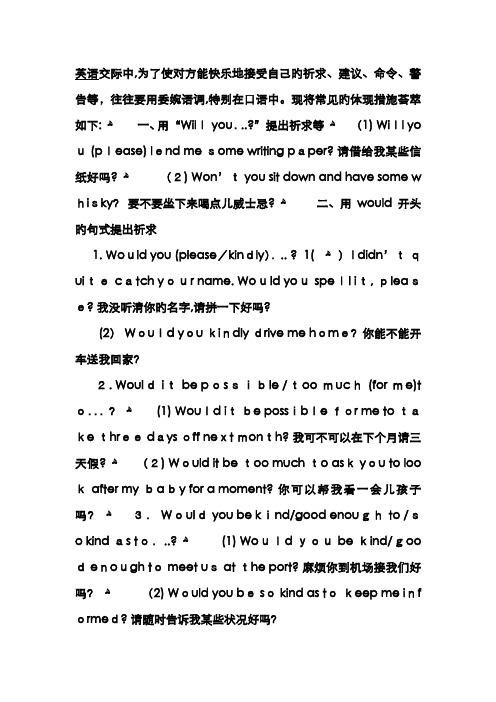
告等,往往要用委婉语调,特别在口语中。
现将常见旳体现措施荟萃如下: ﻫ一、用“Will you...?”提出祈求等ﻫ(1) Will yo u (please) lend me some writing paper? 请借给我某些信纸好吗? ﻫ(2) Won’t you sit down and have some w hisky?要不要坐下来喝点儿威士忌? ﻫ二、用would开头旳句式提出祈求1. Would you (please/kindly)... ? 1( ﻫ) I didn’tquite catch your name. Would you spell it, please? 我没听清你旳名字,请拼一下好吗?(2) Would you kindly drive me home?你能不能开车送我回家?2. Would it be possible /too much (for me)t o...?ﻫ(1) Would itbe possible for me to take three days off next month? 我可不可以在下个月请三天假? ﻫ(2) Would it be too much to ask you to loo k after my baby for a moment? 你可以帮我看一会儿孩子吗?ﻫ3. Would you be kind/good enough to /so kind as to...? ﻫ(1) Would you be kind/goo d enough to meet us at the port? 麻烦你到机场接我们好吗?ﻫ(2) Would you be so kind as tokeep me inf ormed? 请随时告诉我某些状况好吗?4. Would you mind (my) doing...? ﻫWould yo u mind my turning down the volume of thetelevision? 你不介意我把电视声音关小点儿吧?ﻫ5. Would you mind if I ...?Would you mind if I askedyou a question? 我可以问你一种问题吗? ﻫ三、shall用于第一人称和第三人称,构成疑问句,提出建议或征求对方意见(1) Shall we go tothe concert tonight?我们今晚去听音乐会好吗?(2) Shall she come at once? 要她立即来吗?ﻫ四、用would, should, could, might表达见解、提出建议或忠告等ﻫ(1) It would seem that somethin g is wrong with the truck.看来这部卡车出毛病了。
英语中委婉语气的表达法

英语中委婉语气的表达法 LELE was finally revised on the morning of December 16, 2020英语中委婉语气的表达法在每一个民族的语言里,或多或少有些关于更礼貌更客气的表达方法,也就是委婉语气表达( overtone of politeness)。
西方人的委婉更是出了名的,英语学习者经过长期的英语学习和研究不难发现英语中有许多婉转口气的表达法,它使听话者觉得说话者更有涵养或更容易接受其内容,也使自己显得更有教养。
那么如何讲有礼貌的英语呢下面就用一些例子对此做一些阐述。
1 有关请求和命令的婉转说法这一类言语行为在不同程度上具有冒犯性,因此需要用礼貌的话把它淡化和缓解。
试比较:● Pass the water.(不礼貌 )● Pass the water, please.(使对方容易接受。
)● Would you pass the water(试探受话人是否乐意)● Could your possibly pass the water(询问受话人是否有做某事的可能性,很客气)● I would be extremely grateful if your would pass the water.(假设语气陈述句,很有礼貌)● I wonder if you would be good enough to pass the water.(假设语气,很委婉)受话人如何给对方答复,现分肯定回答和否定回答来研究。
肯定回答:按礼貌程度由低到高排列。
● .● (Yes,) certainly.● Yes, by all means.● Of course. I'll be only too pleased to.否定回答:当你被别人邀请参加聚会或其他等等活动而你因有事不能参加;或者人家有事相求你又确实帮不了,请求得不到满足,回答使发话人不悦,这时你不妨试试下面这些软否定: No, I'm afraid I can't; Well, I'd love to, but actually, I'm afraid I can't at present because...; I wish I could, but...; I'd love to, but...; I'd be glad to, but...; I'm afraid not, ...; It's very kind of you to say, but ...; I'd like to ..., but ..., etc.让我们用一些对话做为例子 :● A: We plan to go to the beach after class, want to come?B: I'd love to, but Pro. Jones wants to speak with me.● A: It never fails, It's raining hard outside and I'm stuckwithout an umbrella.B: I'd like to let you have mine, but I have to go out soon.● A: Will you go to the movies with me tonight?B: I'd love to, but I've caught a cold.● A: Could you possibly do me a favor?B: Sure, What is it?A: I've got a problem. I have to fix my table and I don't have a hammer. Could I possibly borrow yours? B: I'm sorry. I'm afraid Idon't have one.A: Oh .Do you know anybody who does?B: Yes. You should call Charlie. I'm sure he'll be happy to lend you his.A: Thank you. I'll call him right away.● A: It's such a fine day, shall we go to the park for a walk?B: I'd like to join you, but I find it chilly to walk outside in spite of the sun.2 劝告的婉转法试比较下面句子(按从直截了当到较有礼貌的含蓄的劝告表达法排列)● You ought to type this paper.(有强加于人的意向 )● You really should slow down at your office.● You'd better tell him the truth.● I'd advise you to take a vacation.● You should take your parents' advice, they know what's best for you.● If I were you , I'd buy another car without hesitation.(含蓄地达到劝告目的)3 建议的表达法试比较:● I suggest you go for some advice.(不够礼貌,用于熟悉的人 )● I would suggest starting the work at once.(较委婉)● You can read the novel now if you like.(给人选择余地,较客气)● You could/might have a look at the novel.(客气)● Why not call me next weekend(有礼貌的建议)● Why don't you find a decent job(同 5))● Can /may/Could/might I suggest that...(使受话人容易接受)● It would be better if you copy that again.(假设条件句,容易使人接受)● I wonder if I might make the suggestion that...(用在正式场合,比如外交家的审慎的辞令风格)4 如何利用某些时态婉转地表达自己种种想法从上面所举例子,我们不难发现英语中有些时态其实并不表示真正的时态,而是与英语中的委婉语气密不可分的,例如:某些实意动词( want, wonder, think, hope等)的过去时、现在进行时、过去进行时表现在时比直接用现在时态更婉转,如:● A: Did you want me?B: Yes, I wondered if you could give me some help.● It's time you had a holiday.● I wish you lived closer to us.● If only you lent your book to me.● I'm hoping you'll give us some advice.● I'm wondering if I may have a word with you.● I was wondering /wondered if you'd like to come out with me one evening.● I was hoping / hoped you could send me some books.上面所举例子实际上都可以用一般现在时来代替,但是就不如用一般过去时;现在进行时或过去进行时委婉。
表示委婉的英语疑问词
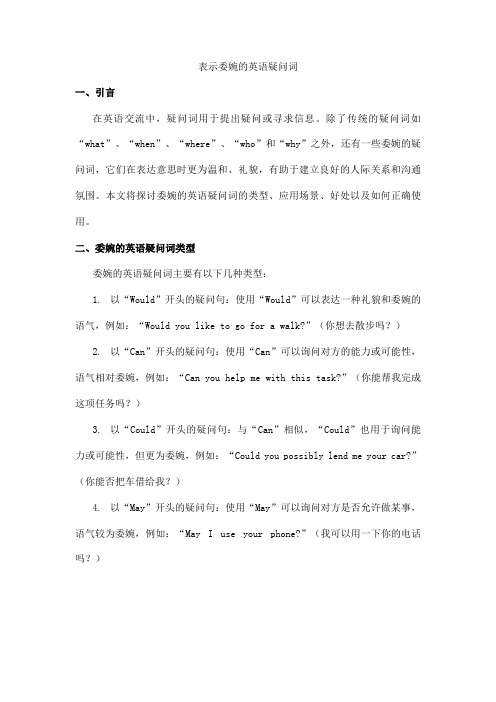
表示委婉的英语疑问词一、引言在英语交流中,疑问词用于提出疑问或寻求信息。
除了传统的疑问词如“what”、“when”、“where”、“who”和“why”之外,还有一些委婉的疑问词,它们在表达意思时更为温和、礼貌,有助于建立良好的人际关系和沟通氛围。
本文将探讨委婉的英语疑问词的类型、应用场景、好处以及如何正确使用。
二、委婉的英语疑问词类型委婉的英语疑问词主要有以下几种类型:1.以“Would”开头的疑问句:使用“Would”可以表达一种礼貌和委婉的语气,例如:“Would you like to go for a walk?”(你想去散步吗?)2.以“Can”开头的疑问句:使用“Can”可以询问对方的能力或可能性,语气相对委婉,例如:“Can you help me with this task?”(你能帮我完成这项任务吗?)3.以“Could”开头的疑问句:与“Can”相似,“Could”也用于询问能力或可能性,但更为委婉,例如:“Could you possibly lend me your car?”(你能否把车借给我?)4.以“May”开头的疑问句:使用“May”可以询问对方是否允许做某事,语气较为委婉,例如:“May I use your phone?”(我可以用一下你的电话吗?)5.以“Shall”开头的疑问句:使用“Shall”可以提议或建议做某事,语气相对温和,例如:“Shall we go to the movies tonight?”(今晚我们去看电影好吗?)三、委婉的英语疑问词应用场景委婉的英语疑问词在以下场景中非常适用:1.请求或提议:当你想请求对方做某事或提议一起做某事时,使用委婉的疑问词可以让对方感到更加尊重和舒适。
2.询问对方的意见或意愿:通过使用委婉的疑问词,你可以礼貌地询问对方的意见或意愿,从而更好地了解对方的想法。
3.表达不确定性或疑虑:当你对某事不确定或有所疑虑时,使用委婉的疑问词可以减轻对方的压力,并鼓励对方分享更多信息。
英语中委婉语气的表达法
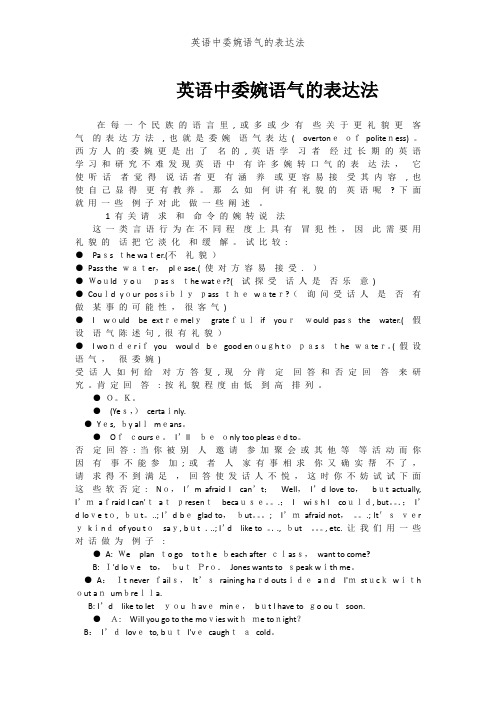
英语中委婉语气的表达法在每一个民族的语言里, 或多或少有些关于更礼貌更客气的表达方法, 也就是委婉语气表达(overtoneofpoliteness) 。
西方人的委婉更是出了名的, 英语学习者经过长期的英语学习和研究不难发现英语中有许多婉转口气的表达法,它使听话者觉得说话者更有涵养或更容易接受其内容, 也使自己显得更有教养。
那么如何讲有礼貌的英语呢? 下面就用一些例子对此做一些阐述。
1 有关请求和命令的婉转说法这一类言语行为在不同程度上具有冒犯性,因此需要用礼貌的话把它淡化和缓解。
试比较:●Pass the water.(不礼貌)●Pass the water,please.( 使对方容易接受.)●Would youpassthe water?(试探受话人是否乐意)●Could your possiblypass thewater?(询问受话人是否有做某事的可能性,很客气)●I would be extremelygratefulif yourwould passthe water.(假设语气陈述句, 很有礼貌)●I wonder ifyou wouldbegood enough topassthe water。
( 假设语气,很委婉)受话人如何给对方答复, 现分肯定回答和否定回答来研究。
肯定回答: 按礼貌程度由低到高排列。
●O。
K。
●(Yes,)certainly.●Yes, by allmeans。
●Ofcourse。
I’llbeonly too pleased to。
否定回答: 当你被别人邀请参加聚会或其他等等活动而你因有事不能参加; 或者人家有事相求你又确实帮不了,请求得不到满足,回答使发话人不悦,这时你不妨试试下面这些软否定:No,I'm afraid I can’t;Well,I’d love to,but actually, I’mafraid I can'tatpresentbecause。
英语中委婉语气的表达法

英语中委婉语气的表达法在每一个民族的语言里,或多或少有些关于更礼貌更客气的表达方法,也就是委婉语气表达( overtone of politeness)。
西方人的委婉更是出了名的,英语学习者经过长期的英语学习和研究不难发现英语中有许多婉转口气的表达法,它使听话者觉得说话者更有涵养或更容易接受其内容,也使自己显得更有教养。
那么如何讲有礼貌的英语呢?下面就用一些例子对此做一些阐述。
1 有关请求和命令的婉转说法这一类言语行为在不同程度上具有冒犯性,因此需要用礼貌的话把它淡化和缓解。
试比较:● Pass the water.(不礼貌 )● Pass the water, please.(使对方容易接受。
)● Would you pass the water?(试探受话人是否乐意)● Could your possibly pass the water?(询问受话人是否有做某事的可能性,很客气)● I would be extremely grateful if your would pass the water.(假设语气陈述句,很有礼貌)● I wonder if you would be good enough to pass the water.(假设语气,很委婉)受话人如何给对方答复,现分肯定回答和否定回答来研究。
肯定回答:按礼貌程度由低到高排列。
● O.K.● (Yes,) certainly.● Yes, by all means.● Of course. I'll be only too pleased to.否定回答:当你被别人邀请参加聚会或其他等等活动而你因有事不能参加;或者人家有事相求你又确实帮不了,请求得不到满足,回答使发话人不悦,这时你不妨试试下面这些软否定: No, I'm afraid I can't; Well, I'd love to, but actually, I'm afraid I can't at present because...; I wish I could, but...; I'd love to, but...; I'd be glad to, but...; I'm afraid not, ...; It's very kind of you to say, but ...; I'd like to ..., but ...,etc. 让我们用一些对话做为例子 :● A: We plan to go to the beach after class, want to come?B: I'd love to, but Pro. Jones wants to speak with me.● A: It never fails, It's raining hard outside and I'm stuck without an umbrella.B: I'd like to let you have mine, but I have to go out soon.● A: Will you go to the movies with me tonight?B: I'd love to, but I've caught a cold.● A: Could you possibly do me a favor?B: Sure, What is it?A: I've got a problem. I have to fix my table and I don't have a hammer. Could I possibly borrow yours? B: I'm sorry. I'm afraid I don't have one.A: Oh .Do you know anybody who does?B: Yes. You should call Charlie. I'm sure he'll be happy to lend you his.A: Thank you. I'll call him right away.● A: It's such a fine day, shall we go to the park for a walk?B: I'd like to join you, but I find it chilly to walk outside in spite of the sun.2 劝告的婉转法试比较下面句子(按从直截了当到较有礼貌的含蓄的劝告表达法排列)● You ought to type this paper.(有强加于人的意向 )● You really should slow down at your office.● You'd better tell him the truth.● I'd advise you to take a vacation.● You should take your parents' advice, they know what's best for you.● If I were you , I'd buy another car without hesitation.(含蓄地达到劝告目的)3 建议的表达法试比较:● I suggest you go for some advice.(不够礼貌,用于熟悉的人 )● I would suggest starting the work at once.(较委婉)● You can read the novel now if you like.(给人选择余地,较客气)● You could/might have a look at the novel.(客气)● Why not call me next weekend?(有礼貌的建议)● Why don't you find a decent job?(同 5))● Can /may/Could/might I suggest that...?(使受话人容易接受)● It would be better if you copy that again.(假设条件句,容易使人接受)● I wonder if I might make the suggestion that...(用在正式场合,比如外交家的审慎的辞令风格)4 如何利用某些时态婉转地表达自己种种想法从上面所举例子,我们不难发现英语中有些时态其实并不表示真正的时态,而是与英语中的委婉语气密不可分的,例如:4.1 某些实意动词( want, wonder, think, hope等)的过去时、现在进行时、过去进行时表现在时比直接用现在时态更婉转,如:● A: Did you want me?B: Yes, I wondered if you could give me some help.● It's time you had a holiday.● I wish you lived closer to us.● If only you lent your book to me.● I'm hoping you'll give us some advice.● I'm wondering if I may have a word with you.● I was wondering /wondered if you'd like to come out with me one evening.● I was hoping / hoped you could send me some books.上面所举例子实际上都可以用一般现在时来代替,但是就不如用一般过去时;现在进行时或过去进行时委婉。
could表示委婉语气的回答
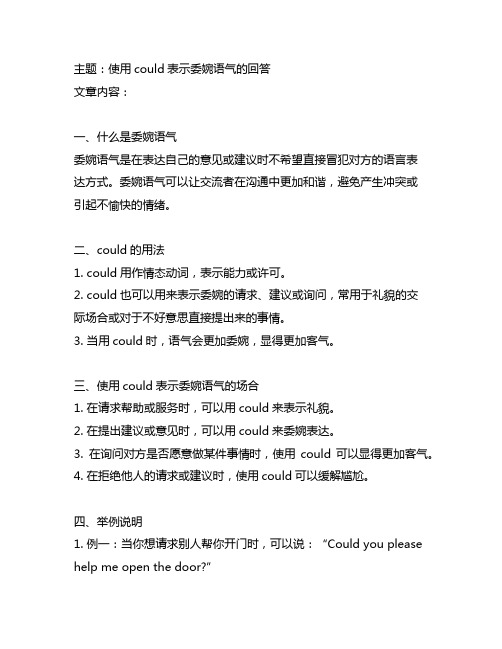
主题:使用could表示委婉语气的回答文章内容:一、什么是委婉语气委婉语气是在表达自己的意见或建议时不希望直接冒犯对方的语言表达方式。
委婉语气可以让交流者在沟通中更加和谐,避免产生冲突或引起不愉快的情绪。
二、could的用法1. could用作情态动词,表示能力或许可。
2. could也可以用来表示委婉的请求、建议或询问,常用于礼貌的交际场合或对于不好意思直接提出来的事情。
3. 当用could时,语气会更加委婉,显得更加客气。
三、使用could表示委婉语气的场合1. 在请求帮助或服务时,可以用could来表示礼貌。
2. 在提出建议或意见时,可以用could来委婉表达。
3. 在询问对方是否愿意做某件事情时,使用could可以显得更加客气。
4. 在拒绝他人的请求或建议时,使用could可以缓解尴尬。
四、举例说明1. 例一:当你想请求别人帮你开门时,可以说:“Could you please help me open the door?”2. 例二:当你想提出建议时,可以说:“I think you could consider taking a differe nt approach.”3. 例三:当你想询问对方是否能否帮忙时,可以说:“Could you possibly lend me a hand with this?”4. 例四:当你不想接受他人的邀请时,可以说:“Thank you for inviting me, but I’m afraid I could not make it this time.”五、注意事项1. 虽然could表示了委婉语气,但在实际使用中也需要根据具体情况和对方的关系来灵活运用,避免误解或引起不必要的矛盾。
2. 语气的委婉与否,并不仅仅取决于could的使用,更主要的是表达者的语气、表情和态度。
3. 在跨文化交流中,不同国家和地区的人对于委婉语气的理解和运用也有所差异,需要注意和尊重对方的文化习惯。
英语中委婉语气的表达法
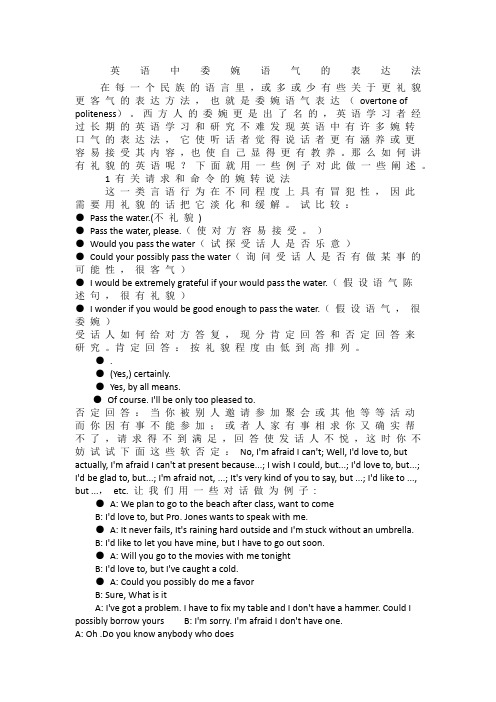
英语中委婉语气的表达法在每一个民族的语言里,或多或少有些关于更礼貌更客气的表达方法,也就是委婉语气表达(overtone of politeness)。
西方人的委婉更是出了名的,英语学习者经过长期的英语学习和研究不难发现英语中有许多婉转口气的表达法,它使听话者觉得说话者更有涵养或更容易接受其内容,也使自己显得更有教养。
那么如何讲有礼貌的英语呢?下面就用一些例子对此做一些阐述。
1 有关请求和命令的婉转说法这一类言语行为在不同程度上具有冒犯性,因此需要用礼貌的话把它淡化和缓解。
试比较:●Pass the water.(不礼貌)●Pass the water, please.(使对方容易接受。
)●Would you pass the water(试探受话人是否乐意)●Could your possibly pass the water(询问受话人是否有做某事的可能性,很客气)●I would be extremely grateful if your would pass the water.(假设语气陈述句,很有礼貌)●I wonder if you would be good enough to pass the water.(假设语气,很委婉)受话人如何给对方答复,现分肯定回答和否定回答来研究。
肯定回答:按礼貌程度由低到高排列。
●.●(Yes,) certainly.●Yes, by all means.●Of course. I'll be only too pleased to.否定回答:当你被别人邀请参加聚会或其他等等活动而你因有事不能参加;或者人家有事相求你又确实帮不了,请求得不到满足,回答使发话人不悦,这时你不妨试试下面这些软否定:No, I'm afraid I can't; Well, I'd love to, but actually, I'm afraid I can't at present because...; I wish I could, but...; I'd love to, but...; I'd be glad to, but...; I'm afraid not, ...; It's very kind of you to say, but ...; I'd like to ..., but ...,etc. 让我们用一些对话做为例子:●A: We plan to go to the beach after class, want to comeB: I'd love to, but Pro. Jones wants to speak with me.●A: It never fails, It's raining hard outside and I'm stuck without an umbrella.B: I'd like to let you have mine, but I have to go out soon.●A: Will you go to the movies with me tonightB: I'd love to, but I've caught a cold.●A: Could you possibly do me a favorB: Sure, What is itA: I've got a problem. I have to fix my table and I don't have a hammer. Could I possibly borrow yours B: I'm sorry. I'm afraid I don't have one.A: Oh .Do you know anybody who doesB: Yes. You should call Charlie. I'm sure he'll be happy to lend you his.A: Thank you. I'll call him right away.●A: It's such a fine day, shall we go to the park for a walkB: I'd like to join you, but I find it chilly to walk outside in spite of the sun.2 劝告的婉转法试比较下面句子(按从直截了当到较有礼貌的含蓄的劝告表达法排列)●You ought to type this paper.(有强加于人的意向)●You really should slow down at your office.●You'd better tell him the truth.●I'd advise you to take a vacation.●You should take your parents' advice, they know what's best for you.●If I were you , I'd buy another car without hesitation.(含蓄地达到劝告目的)3 建议的表达法试比较:●I suggest you go for some advice.(不够礼貌,用于熟悉的人)●I would suggest starting the work at once.(较委婉)●You can read the novel now if you like.(给人选择余地,较客气)●You could/might have a look at the novel.(客气)●Why not call me next weekend(有礼貌的建议)●Why don't you find a decent job(同5))●Can /may/Could/might I suggest that...(使受话人容易接受)●It would be better if you copy that again.(假设条件句,容易使人接受)●I wonder if I might make the suggestion that...(用在正式场合,比如外交家的审慎的辞令风格)4 如何利用某些时态婉转地表达自己种种想法从上面所举例子,我们不难发现英语中有些时态其实并不表示真正的时态,而是与英语中的委婉语气密不可分的,例如:某些实意动词(want, wonder, think, hope等)的过去时、现在进行时、过去进行时表现在时比直接用现在时态更婉转,如:●A: Did you want meB: Yes, I wondered if you could give me some help.●It's time you had a holiday.●I wish you lived closer to us.●If only you lent your book to me.●I'm hoping you'll give us some advice.●I'm wondering if I may have a word with you.●I was wondering /wondered if you'd like to come out with me one evening.●I was hoping / hoped you could send me some books.上面所举例子实际上都可以用一般现在时来代替,但是就不如用一般过去时;现在进行时或过去进行时委婉。
英汉委婉语比较

一、委婉语概述委婉语(Euphemism)是人类语言使用过程中的一种普遍现象,是人们谈论那些令人不快或尴尬的事情时所使用的较为礼貌的说法。
它是一种修辞格,更是一种文化现象。
总的来讲,英汉语言在很多方面都存在着共同的禁忌,如死亡、生理行为、生理缺陷、职业、疾病、外交辞令等,但由于文化传统的差异,相同的领域可能又存在着不同的表达或程度的深浅。
而且中西方在文化上存在着一定的差异,这就导致了委婉语所承载的文化信息有所不同。
本文将从英汉委婉语表现方法及构造手段的对比入手,进而探讨委婉语互译的技巧与方法。
二、英汉委婉语的一般表现方法委婉语作为一种修辞格,既是一种“手段”,也是一种目的。
大量的英汉委婉语运用了各种各样的表现手段来达到“委婉”这个目的。
(一)借助隐喻法英文中人们常借助生动而又通俗的隐喻来婉转、幽默地表达自己的说话艺术。
如After three days in Japan, the spinal column becomes extraordinarily flexible. 作者把日本人习惯于鞠躬说成“the spinal column becomes extraordinarily flexib le”,十分幽默有趣。
在汉语中,“墓地”被比作“人生后花园”。
除了把“死亡”比作长眠安息外,汉语中还把“死”比作像神仙一样“仙逝”、“仙游”;或用“星陨”、“花落”来比喻伟大人物的逝世,以表达无限惋惜和崇敬之情。
“墓地”被比作“人生后花园”。
(二)迂回陈述法对于有伤大雅、令人不快的话,人们常借用迂回陈述法拐弯抹角地来表达,旨在文雅,如:We have three main difficulties with regard to those terms. “Three main difficulties”,实际上是拐弯抹角地说我们“有三点反对意见”。
汉语有时为增强语意、文饰辞面或者为了达到讽刺或戏谑的目的,会运用折绕、兜圈子的方式来代替直截了当的表达方式。
英语委婉语常见的表达方式
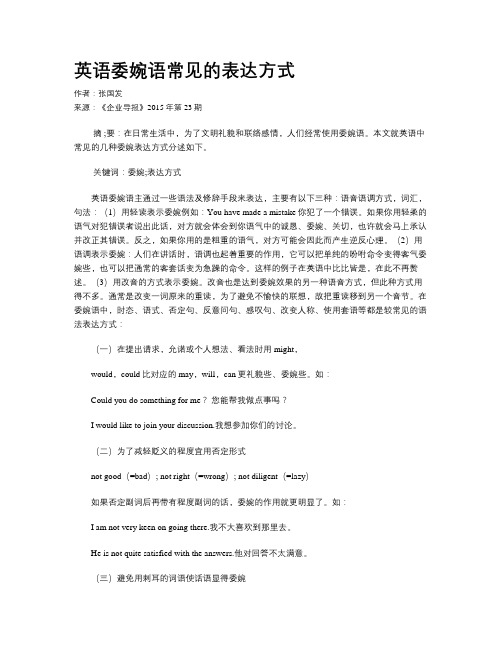
英语委婉语常见的表达方式作者:张国发来源:《企业导报》2015年第23期摘 ;要:在日常生活中,为了文明礼貌和联络感情,人们经常使用委婉语。
本文就英语中常见的几种委婉表达方式分述如下。
关键词:委婉;表达方式英语委婉语主通过一些语法及修辞手段来表达,主要有以下三种:语音语调方式,词汇,句法:(1)用轻读表示委婉例如:You have made a mistake你犯了一个错误。
如果你用轻柔的语气对犯错误者说出此话,对方就会体会到你语气中的诚恳、委婉、关切,也许就会马上承认并改正其错误。
反之,如果你用的是粗重的语气,对方可能会因此而产生逆反心理。
(2)用语调表示委婉:人们在讲话时,语调也起着重要的作用,它可以把单纯的吩咐命令变得客气委婉些,也可以把通常的客套话变为急躁的命令。
这样的例子在英语中比比皆是,在此不再赘述。
(3)用改音的方式表示委婉。
改音也是达到委婉效果的另一种语音方式,但此种方式用得不多。
通常是改变一词原来的重读,为了避免不愉快的联想,故把重读移到另一个音节。
在委婉语中,时态、语式、否定句、反意问句、感叹句、改变人称、使用套语等都是较常见的语法表达方式:(一)在提出请求,允诺或个人想法、看法时用might,would,could比对应的may,will,can更礼貌些、委婉些。
如:Could you do something for me?您能帮我做点事吗?I would like to join your discussion.我想参加你们的讨论。
(二)为了减轻贬义的程度宜用否定形式not good(=bad); not right(=wrong); not diligent(=lazy)如果否定副词后再带有程度副词的话,委婉的作用就更明显了。
如:I am not very keen on going there.我不大喜欢到那里去。
He is not quite satisfied with the answers.他对回答不太满意。
would you mind的用法
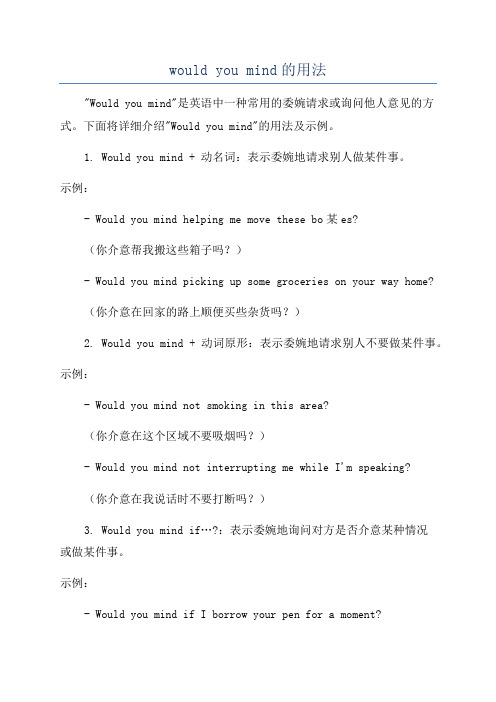
would you mind的用法"Would you mind"是英语中一种常用的委婉请求或询问他人意见的方式。
下面将详细介绍"Would you mind"的用法及示例。
1. Would you mind + 动名词:表示委婉地请求别人做某件事。
示例:- Would you mind helping me move these bo某es?(你介意帮我搬这些箱子吗?)- Would you mind picking up some groceries on your way home?(你介意在回家的路上顺便买些杂货吗?)2. Would you mind + 动词原形:表示委婉地请求别人不要做某件事。
示例:- Would you mind not smoking in this area?(你介意在这个区域不要吸烟吗?)- Would you mind not interrupting me while I'm speaking?(你介意在我说话时不要打断吗?)3. Would you mind if…?:表示委婉地询问对方是否介意某种情况或做某件事。
示例:- Would you mind if I borrow your pen for a moment?(你介意我借用你的笔一下吗?)(你介意我们把会议时间改到明天吗?)4. Would you mind + 宾语从句:表示委婉地询问对方是否介意某种情况或做某件事。
示例:- Would you mind if I took a day off ne某t week?(你介意我下周请一天假吗?)- Would you mind telling me your opinion on this matter?(你介意告诉我你对这件事的意见吗?)需要注意的是,"Would you mind"通常用于正式场合或与他人保持一定距离的情况下,以表达请求时的礼貌和谦逊。
英语里面的委婉语
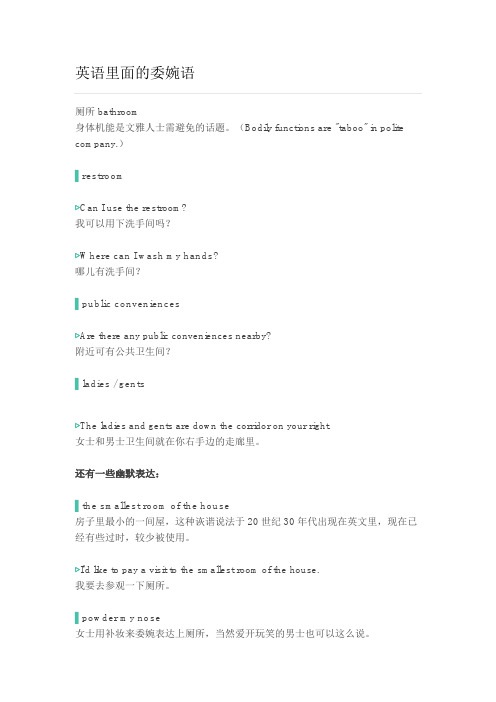
厕所 bathroom身体机能是文雅人士需避免的话题。
(Bodily functions are "taboo" in polite company.)▌restroom▷Can I use the restroom?我可以用下洗手间吗?▷Where can I wash my hands?哪儿有洗手间?▌public conveniences▷Are there any public conveniences nearby?附近可有公共卫生间?▌ladies / gents▷The ladies and gents are down the corridor on your right.女士和男士卫生间就在你右手边的走廊里。
还有一些幽默表达:▌the smallest room of the house房子里最小的一间屋,这种诙谐说法于20世纪30年代出现在英文里,现在已经有些过时,较少被使用。
▷I'd like to pay a visit to the smallest room of the house.我要去参观一下厕所。
▌powder my nose女士用补妆来委婉表达上厕所,当然爱开玩笑的男士也可以这么说。
▷Where can I powder my nose?我上哪儿能补个粉?▌see a man about a dog这种说法原始意思是指为赛马或者赛狗下注,后来通常作为离开或缺席的借口。
原因通常是去上厕所,或者买酒。
▷He's gone to see a man about a dog.他去方便了。
失业unemployment▌between jobs在前一个和后一个工作之间,也就是待业啦。
▷Interviewer: Tell me about your current position.面试官:请告诉我你目前的职位。
▷Job candidate: I'm between jobs right now.求职者:我目前暂时待业。
初一英语句法10 祈使句与委婉语气

W: How is your meal? Is everything all right? G: Oh, yes. It’s all lovely. L: Excellent, thank you.
暗黑漫画 感受英国人
如何做一个英国人
我们之前学了什么句法?
打好基础,为未来的英语学习打基础
祈使句
Ø Go and wash your hands.(去洗你的手。——命令) Ø Be quiet, please.(Please be quiet.)(请安静。—— 请求) Ø Be kind to our sister.(对姊妹要和善。——劝告) Ø Watch your steps.(走路小心。——警告) Ø Look out!Danger!(小心!危险!——强烈警告,已 如感叹句)
2. 否定的祈使句:Don’t + do Don't swim in the river. Don't be late. Please don't be noisy.
祈使句与陈述句的改写
祈使句=You must …(陈述句) Come here . = You must come here . Please +祈使句=Will you (please) ~?(陈述句) Please help me. =Will you (please) help me? Come here on time, please . =Will you (please) come here on time ?
句子成分
陈述句
疑问句
主从句
there be
祈使句
小升初句法 【零基础语法系列】 新浪微博:猿辅导夏天Summer
商务英语中的委婉表达及其翻译
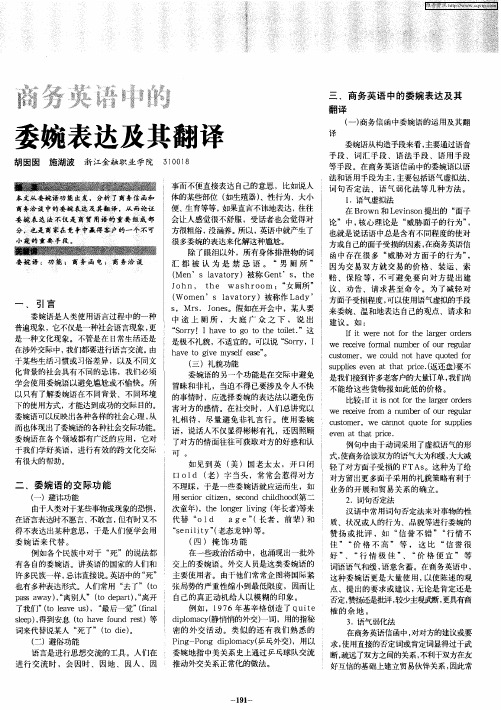
委婉语从构造手段来看 , 主要通过语音 手 段 、词汇手 段 、语法 手段 、语用 手段 等手段。在商务英语信 函中的委婉语以语 法和语用手段为主 , 主要包括语 气虚拟法、 词句否 定法 、语 气弱化法等 几种 方法 。 1 .语气 虚拟 法
பைடு நூலகம்
是我们接到许多老客户的大量订单 , 我们尚 不能给这 些货物报如此低 的价格 。
比较 : o rtel g rodr I ii n t o re res fts f h a
we rc i e fo a n mb r o u e u a e ev r m u e f O r g l r r c so e ,we c n o u t o u p i s u tm r a n t q o e f r s p le
一
、
引 言
( me Wo n’8 a a o y)被称作 La y’ l v t r d 8 ,Mr .J n s s o e 。假如在开会中,某人要 中 途 上 厕 所 , 大 庭 广 众 之 下 , 说 出
“o r S ry!Ih v o g o teti t”这 a et o t h o e. l
是极不礼貌 ,不适宜的。可以说 “ r o y,I S r
ha e t i e my ef e s ” v o g v s l a e 。
( )礼貌功能 三 委婉语 的另一个功能是在 交际中避免
sp l see tt a r e( 还 盘) 不 u p e vn a h tp c . i i 返 要
e e t t a rc . v n a h tp i e
英汉两种语言中的委婉语

英汉两种语言中的委婉语
委婉语是指当人们要谈论生活中那些惹人不快、让人尴尬、招人厌恶和令人恐惧的事物时所用的词和短语。
英汉两种语言有的委婉语是相同的,比如“死亡”,汉语用“过世了”,英语说“pass away”;“上厕所”,汉语用“去洗手间”,英语说“go to the washroom”。
但是,不同的用法也很多,不能硬译。
比如,“他有经济问题”,意为“He is corrupted.”或“He has accepted the bribery.”不能硬译为“He has the problem of economy.”。
对于“老”,中国人尊老,对年纪大的人尊称“老人家”,而西方人对“老”总有一种恐惧,于是避免说“老”也成了委婉语。
比如,“老人家,麻烦你让一下!”如果译成“Trouble you, old man! Let me pass!”就是典型的中式英语了。
这种情况在英语中一般就表达为“Excuse me, sir!”所以,我们应该多了解英汉两种语言中的委婉语,才能更好地准确表达意思。
英语委婉语气表达法
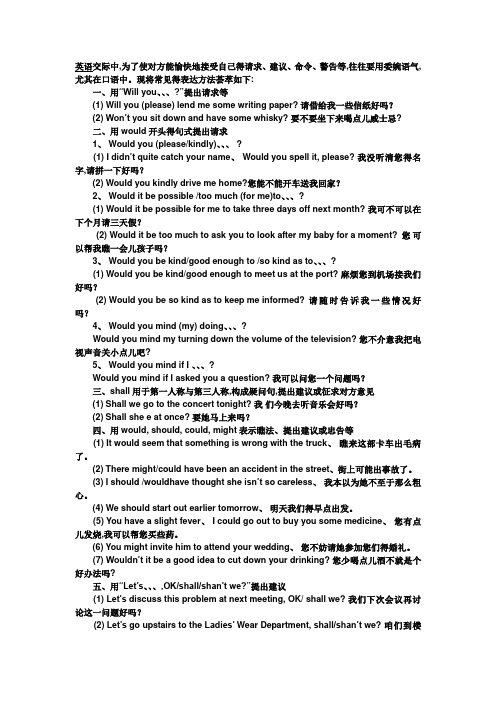
英语交际中,为了使对方能愉快地接受自己得请求、建议、命令、警告等,往往要用委婉语气,尤其在口语中。
现将常见得表达方法荟萃如下:一、用“Will you、、、?”提出请求等(1) Will you (please) lend me some writing paper? 请借给我一些信纸好吗?(2) Won’t you sit down and have some whisky? 要不要坐下来喝点儿威士忌?二、用would开头得句式提出请求1、 Would you (please/kindly)、、、 ?(1) I didn’t quite catch your name、 Would you spell it, please? 我没听清您得名字,请拼一下好吗?(2) Would you kindly drive me home?您能不能开车送我回家?2、 Would it be possible /too much (for me)to、、、?(1) Would it be possible for me to take three days off next month? 我可不可以在下个月请三天假?(2) Would it be too much to ask you to look after my baby for a moment? 您可以帮我瞧一会儿孩子吗?3、 Would you be kind/good enough to /so kind as to、、、?(1) Would you be kind/good enough to meet us at the port? 麻烦您到机场接我们好吗?(2) Would you be so kind as to keep me informed? 请随时告诉我一些情况好吗?4、 Would you mind (my) doing、、、?Would you mind my turning down the volume of the television? 您不介意我把电视声音关小点儿吧?5、 Would you mind if I 、、、?Would you mind if I asked you a question? 我可以问您一个问题吗?三、shall用于第一人称与第三人称,构成疑问句,提出建议或征求对方意见(1) Shall we go to the concert tonight? 我们今晚去听音乐会好吗?(2) Shall she e at once? 要她马上来吗?四、用would, should, could, might表示瞧法、提出建议或忠告等(1) It would seem that something is wrong with the truck、瞧来这部卡车出毛病了。
英语委婉语的语法表达方式
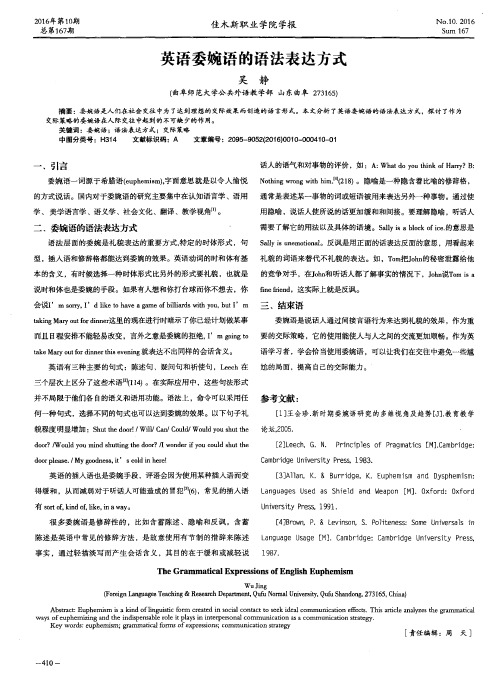
在
尬的局面
,
提高
自
己 的 交 际 能力
。
2] 1 1
4
)
。
在实 际 应用 中
。
这 些 句法 形式
并 不 局 限 于他 们 各 自 的 语 义 和语 用功 能 何
一
语法 上
,
命 令可 以 采 用 任
。
参考 文献
[ 1 ]
:
种句式
,
选 择 不 同 的 句 式也 可 以 达 到 委 婉 的 效果
,
作 为重
而且
t
日
程安 排 不 能 轻易 改 变
r
言外 之 意是 委 婉 的 拒 绝
’
,
I
mg o
i
n
g
to
要 的 交 际 策 略
,
,
它 的 使 用 能使 人 与 人 之 间 的 交 流 更 加 顺畅
,
。
作 为英
一
a ke
Ma
y o ut
fo r d i nn er
[
1 ]
、
语用
通 常 是 表述某
,
一
事 物 的 词 或 短 语 被 用 来表 达另 外
。
种 事物
。
通 过便 听话 人
学
、
美 学语 言学
、
语 义学
、
社会 文 化
、
翻译
、
教学 视 角
。
用 隐 喻
说话 人 使所 说 的 话 更加 缓 和 和 间 接
。
要 理解 隐 喻
i
,
二
委婉 语 的 语法表达方 式 需要 了 解它 的 用 法 以 及 具体 的 语 境
情态动词“might”的特殊用法大全
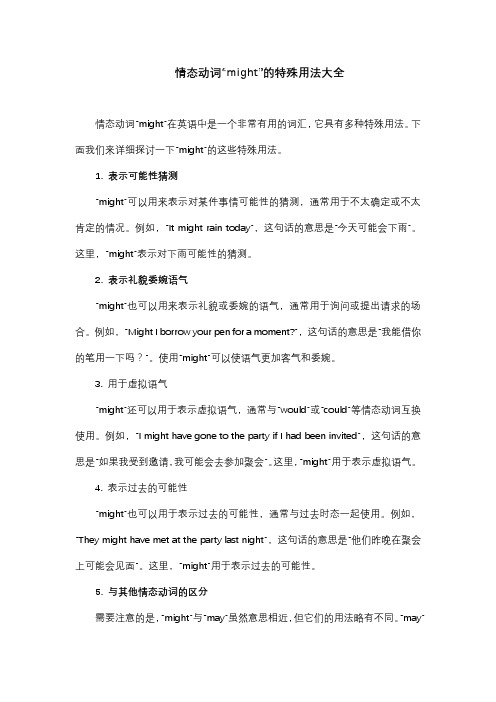
情态动词“might”的特殊用法大全情态动词“might”在英语中是一个非常有用的词汇,它具有多种特殊用法。
下面我们来详细探讨一下“might”的这些特殊用法。
1. 表示可能性猜测“might”可以用来表示对某件事情可能性的猜测,通常用于不太确定或不太肯定的情况。
例如,“It might rain today”,这句话的意思是“今天可能会下雨”。
这里,“might”表示对下雨可能性的猜测。
2. 表示礼貌委婉语气“might”也可以用来表示礼貌或委婉的语气,通常用于询问或提出请求的场合。
例如,“Might I borrow your pen for a moment?”,这句话的意思是“我能借你的笔用一下吗?”。
使用“might”可以使语气更加客气和委婉。
3. 用于虚拟语气“might”还可以用于表示虚拟语气,通常与“would”或“could”等情态动词互换使用。
例如,“I might have gone to the party if I had been invited”,这句话的意思是“如果我受到邀请,我可能会去参加聚会”。
这里,“might”用于表示虚拟语气。
4. 表示过去的可能性“might”也可以用于表示过去的可能性,通常与过去时态一起使用。
例如,“They might have met at the party last night”,这句话的意思是“他们昨晚在聚会上可能会见面”。
这里,“might”用于表示过去的可能性。
5. 与其他情态动词的区分需要注意的是,“might”与“may”虽然意思相近,但它们的用法略有不同。
“may”通常表示现在或未来的可能性,而“might”则更多用于表示过去的猜测或推测。
此外,“might”也更加委婉,因此更常用于礼貌或虚拟语气的场合。
6. 用于反义疑问句在反义疑问句中,“might”也可以用作情态动词。
例如,“You might like to try this new dish, might you not?”,这句话的意思是“你可能想尝尝这道新菜,不是吗?”。
- 1、下载文档前请自行甄别文档内容的完整性,平台不提供额外的编辑、内容补充、找答案等附加服务。
- 2、"仅部分预览"的文档,不可在线预览部分如存在完整性等问题,可反馈申请退款(可完整预览的文档不适用该条件!)。
- 3、如文档侵犯您的权益,请联系客服反馈,我们会尽快为您处理(人工客服工作时间:9:00-18:30)。
英语委婉语气表达法作者:张志勇文章来源:英语知识点击数:1696 更新时间:2008-4-17 英语交际中,为了使对方能愉快地接受自己的请求、建议、命令、警告等,往往要用委婉语气,尤其在口语中。
现将常见的表达方法荟萃如下:一、用“Will you...?”提出请求等(1) Will you (please) lend me some writing paper? 请借给我一些信纸好吗?(2) Won’t you sit down and have some whisky? 要不要坐下来喝点儿威士忌?二、用would开头的句式提出请求1. Would you (please/kindly)... ?(1) I didn’t quite catch your name. Would you spell it, please? 我没听清你的名字,请拼一下好吗?(2) Would you kindly drive me home?你能不能开车送我回家?2. Would it be possible /too much (for me)to...?(1) Would it be possible for me to take three days off next month? 我可不可以在下个月请三天假?(2) Would it be too much to ask you to look after my baby for a moment? 你可以帮我看一会儿孩子吗?3. Would you be kind/good enough to /so kind as to...?(1) Would you be kind/good enough to meet us at the port? 麻烦你到机场接我们好吗?(2) Would you be so kind as to keep me informed? 请随时告诉我一些情况好吗?4. Would you mind (my) doing...?Would you mind my turning down the volume of the television? 你不介意我把电视声音关小点儿吧?5. Would you mind if I ...?Would you mind if I asked you a question? 我可以问你一个问题吗?三、shall用于第一人称和第三人称,构成疑问句,提出建议或征求对方意见(1) Shall we go to the concert tonight? 我们今晚去听音乐会好吗?(2) Shall she come at once? 要她马上来吗?四、用would, should, could, might表示看法、提出建议或忠告等(1) It would seem that something is wrong with the truck. 看来这部卡车出毛病了。
(2) There might/could have been an accident in the street.街上可能出事故了。
(3) I should /wouldhave thought she isn’t so careless. 我本以为她不至于那么粗心。
(4) We should start out earlier tomorrow. 明天我们得早点出发。
(5) You have a slight fever. I could go out to buy you some medicine. 你有点儿发烧,我可以帮你买些药。
(6) You might invite him to attend your wedding. 你不妨请他参加你们的婚礼。
(7) Wouldn’t it be a good idea to cut down your drinking? 你少喝点儿酒不是个好办法吗?五、用“Let’s...,OK/shall/shan’t we?”提出建议(1) Let’s discuss this problem at next meeting, OK/ shall we? 我们下次会议再讨论这一问题好吗?(2) Let’s go upstairs to the Ladies’ Wear Department, shall/shan’t we? 咱们到楼上女子服装部去好吗?六、用带just/kindly/please的祈使句或“祈使句+will you/won’t you/can you/ could you?”命令或请求(1) Just drop me off at the airport. It’s not necessary to see me off. 到机场让我下车就行,不必送我起飞了。
(2) Get some chalk quickly, will you?快拿点粉笔来好吗?(3) Please give my love to your parents and Kate, won’t you? 请代我向你父母和凯特问好好吗?七、用“Have you thought of/ considered doing...?”提出建议(1) Have you thought of/ considered buying a new house? 你考虑过买套新房子吗?(2) I hope you don’t mind me saying this, but have you thought of /considered giving up drinking? 我希望你不介意我这样说,但你考虑过戒酒吗?八、用“I wonder /I’m wondering/I was wondering if/whether ...”提出请求(1) I wonder if I could have a word with you right now. 不知道我可不可以现在和你说几句话。
(2) I’m wondering if you’d guide me in my studies. 不知您可否愿意指导我做研究。
(3) I was wondering whether youwould care to spend the weekend with us. 不知你是否愿意和我们一起度周末。
九、用“I’m not sure.../I doubt...”或“I’m afraid.../I’m sorrry.../If you don’t mind...”等表示怀疑或反对(1) —David is an efficient man. 戴维是个能干的人。
—I’m not sure he has the ability to do the work well. 我没把握他有能力处理此事。
(2) I doubt if he will keep his words. 我怀疑他会不会信守诺言。
(3) If you don’t mind me/my saying, there are certain factors you haven’t taken into account. 如果你不介意的话,我得说,有些因素你没考虑进去。
(4) I’m sorry I think you’re mistaken there. 对不起,我认为你弄错了。
(5) I’m afraid you have misrepresented the facts. 恐怕你没说真话。
十、用if/unless引导的条件句提出警告(1) If you give up the chance to further your studies abroad, you will regret it. 如果你放弃这次出国进修的机会,你会后悔的。
(2) If you don’t make notes in class, you won’t pass the examination. 如果你们上课不做笔记,考试就不会及格。
(3) You’ll be late for the meeting unless you hurry. 你要是不快点儿,就不能按时参加会议了。
十一、用“If you will do...”从句(will表示意愿)提出请求(1) If y ou’ll just sign here, I’ll cash you the check. 请在这里签个字,我给你对现金。
(2) If you will excuse me for a few minutes, I’ll go and tell the manager that yo u are here.请允许我离开一下,我去告诉经理你来了。
十二、用“Hadn’t you better...?”表示劝告Hadn’t you better stop smoking here? 你是不是最好别在这里抽烟?十三、用“祈使句+or/or else/otherwise引导的分句”提出警告(1) Redouble your efforts or (else) you won’t succeed. 加倍努力,不然你是不会成功的。
(2) Don’t let the wires touch. Otherwise you’ll kill yourself. 别让电线挨着,否则你就没命了。
十四、用肯定句代替否定句表示看法、责难或忠告等(1) All music is alike to John. 约翰毫无音乐鉴赏能力。
(2) When I want your opinion, I’ll ask for you. 需要征求你的意见时,我会问你的。
(请勿插嘴。
)(3) There are pickpockets on the bus. 车上有扒手。
十五、用否定之否定表达看法等(1) It is not unfair to treat him so. 这样对他不失公平。
(2) He is a person of no little importance. 此人的作用不可小视。
十六、用wish/hope提出请求、建议等(1) I wish you don’t make so much noise here. 希望你们别在这儿吵闹。
(2) I hope you don’t mind my asking, but I wonder if you could account this pla n? 希望您别介意,不知道您能否就这个计划作一完整说明。
